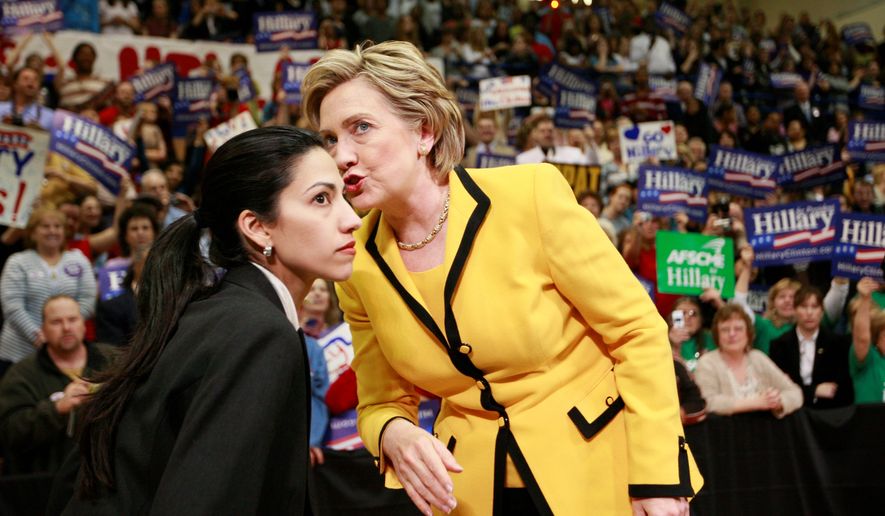A federal judge on Wednesday ordered Hillary Clinton’s top aides to answer questions about her secret email server, including detailing who made the decision to set it up and whether it was intended to thwart open records laws.
Top Clinton aides Huma Abedin and Cheryl D. Mills will be deposed, as will Bryan Pagliano, who reportedly maintained the clintonemail.com server and Mrs. Clinton’s email account tied to the secret system.
Mrs. Clinton herself could also have to answer questions in the open records case brought by Judicial Watch, according to Judge Emmet G. Sullivan’s order — though he said a decision on that would be made later.
“The circumstances surrounding approval of Mrs. Clinton’s use of clintonemail.com for official government business, as well as the manner in which it was operated, are issues that need to be explored in discovery to enable the Court to resolve, as a matter of law, the adequacy of the State Department’s search of relevant records in response to Judicial Watch’s [Freedom of Information Act] request,” Judge Sullivan wrote.
He gave Judicial Watch eight weeks to conduct the interviews, meaning they will be finished just weeks before Mrs. Clinton hopes to accept the Democratic presidential nomination at the party’s national convention in Philadelphia in late July.
The emails have dogged Mrs. Clinton’s presidential campaign from the start and have damaged her standing among many voters, who question her honesty.
Presumptive Republican presidential nominee Donald Trump openly speculates that Mrs. Clinton will be indicted at the end of an FBI investigation into the server.
SEE ALSO: Hillary Clinton: ‘Whole world’ wants me to beat Donald Trump
“Under investigation by the FBI,” Mr. Trump told CNN on Wednesday. “Maybe she won’t even be able to run.”
Mrs. Clinton set up the server at her home in New York in 2009, soon after she became secretary. She said she made the decision because it was convenient for her — though at least some of the internal communications suggest that she also hoped to shield her communications from public scrutiny.
While President Obama, his chiefs of staff and dozens of other top administration officials knew of Mrs. Clinton’s odd email arrangement, the people at her department in charge of responding to open-records requests did not.
That meant her messages were erroneously shielded from disclosure for six years, until she belatedly returned some 30,000 to the department in December 2014.
Mrs. Clinton said there were 30,000 other messages from her time in office that were strictly private and did not implicate her government activities. She declined to turn over those messages, saying the law gave her the obligation of deciding what was official and what was personal.
Judicial Watch says the decision shouldn’t be hers anymore because she is no longer a government employee. It wants to force the Obama administration to take control of Mrs. Clinton’s entire email file, including the messages she didn’t return.
On Wednesday, the group praised Judge Sullivan’s order.
“This is a significant victory for transparency and accountability,” said Tom Fitton, the group’s president. “Judicial Watch will use this discovery to get all of the facts behind Hillary Clinton’s and the Obama State Department’s thwarting of FOIA so that the public can be sure that all of the emails from her illicit email system are reviewed and released to the public as the law requires.”
In his order Wednesday, Judge Sullivan seemed troubled by an email exchange involving Stephen Mull, a department official who recommended that Mrs. Clinton use an official BlackBerry, but said that would make her messages “subject to FOIA requests” — seemingly suggesting that her secret server was an effort to skirt those open-records laws.
Ms. Abedin, who was Mrs. Clinton’s closest personal assistant, replied that she was cool to the idea of using an official BlackBerry because it “doesn’t make a whole lot of sense.”
Judge Sullivan also seemed concerned by an inspector general’s report this year that found while top aides knew of Mrs. Clinton’s secret account, nobody ever made the lower-level staffers who handled open-records cases aware of it.
He said Judicial Watch can ask about the creation and operation of Mrs. Clinton’s email account, the State Department’s decision-making in approving its use and how the department processed her emails for release. Also under scrutiny are emails Ms. Abedin sent from her own account on Mrs. Clinton’s secret server.
Judge Royce Lamberth, who like Judge Sullivan sits in U.S. District Court for the District of Columbia, has granted discovery powers to Judicial Watch in another Clinton email case. Judge Lamberth was awaiting Judge Sullivan’s decision before taking the next step.
• Stephen Dinan can be reached at sdinan@washingtontimes.com.




Please read our comment policy before commenting.